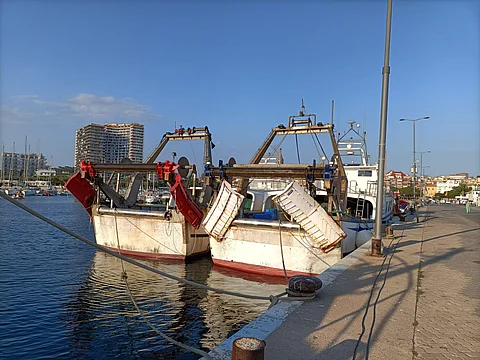

Trawling devices with flying doors reduce the impact on the seabed and save diesel consumption.
Photo: Spain's Ministry of Agriculture, Fisheries and Food.
Spain's Ministry of Agriculture, Fisheries and Food has published a resolution awarding additional fishing days to those vessels in the Mediterranean fleet that have made efforts to implement trawl devices with flying doors. Also known as semi-pelagic or off-bottom doors, they are designed to operate above the seabed, rather than dragging on it.
This system not only significantly reduces the impact of trawling on the seabed but also reduces diesel consumption by up to 30%, thus contributing to both environmental sustainability and the economic efficiency of the activity.
Thus, the Spanish Ministry of Agriculture, Fisheries and Food has announced that in 2025, 192 Mediterranean trawlers will receive 80% more fishing days than in 2024. This figure represents an increase of 60% over last year, when 120 vessels benefited.
The measure is part of the regulation that reserves 3% of the total fishing effort allocated to Spain by the European Union to incentivize the use of flying-door trawl devices. In total, 2,201 additional fishing days have been allocated to the Mediterranean trawl fleet for 2025, compared to the 1,233 days allocated in 2024, which corresponded to 1% of the days granted.
The Spanish Ministry of Agriculture, Fisheries and Food highlighted that this remarkable increase - 968 days more, 78.5% up on last year - reflects "the commitment of the Mediterranean fishing sector to a more sustainable and respectful activity with the marine environment."
In addition, vessels that incorporate these flying doors will have a further incentive, as they will also be able to participate on a voluntary basis in a scientific campaign to evaluate their impact on fisheries and the seabed. Participation in this initiative will allow access to 2% of the fishing days allocated to Spain for scientific research activities.
"Fishing days are managed to benefit those who are committed to the protection of marine resources, and the role of science is strengthened to improve their conservation and management," Spain's Ministry of Agriculture, Fisheries and Food highlighted in its release on the measure.
Likewise, the Ministry also reminded that those trawlers wanting to install these flying doors have the possibility to count on EU funding through the European Maritime, Fisheries and Aquaculture Fund (EMFAF), which last year already served to finance the MEDITS_ES_2024 campaign for the assessment of fishery resources - abundance and population structure - of species targeted by the Mediterranean trawling fishing fleet.
The measures now taken by Spain come at a time when decisions around trawl fishing in Europe are pointing more towards prohibition or restriction. Ireland has been the last country to announce this kind of measure, speaking of its intention to place certain restriction on trawling activity by large vessels inside the six nautical mile zone and the baselines.
It thus joined previous announcements by the UK, which wants to extend the ban on bottom trawling, or Sweden, which has also taken measures to protect the Baltic Sea by banning bottom fishing in marine protected areas.
Meanwhile, in June, marine scientists from around the world signed an open letter to the United Nations (UN) urging the protection of vulnerable marine ecosystems from bottom fishing, and, in July, the ocean advocacy NGO BLOOM filed a formal legal notice to the French state, demanding immediate action to stop bottom trawling.
